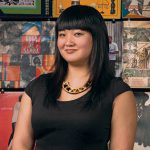
As the information profession rapidly shifts due to changes in information dissemination, technology, and shifting user expectations, libraries and archives are compelled to demonstrate their relevance to the communities in which they are embedded. Many presentations at DLF addressed this challenge with the clear message that libraries and archives demonstrate their value by critically assessing their organization’s role in a larger social and political context and working alongside communities as a force for social good, while recognizing that libraries and technology are not necessarily “existentially good.” I appreciated that DLF, as an organization, prioritized the intellectual and professional contributions of gender non-conforming folks and people of color through its selection of keynote speakers. This sets a powerful example for other professional organizations to follow.
When a library conference’s opening keynote address challenges the audience to [pullquote1 align=”right”]Begin to be hopeful that maybe, just maybe, there exists a professional space that centers social justice as a core principle as opposed to a peripheral interest.[/pullquote1]
critically interrogate the “existential good” we often take for granted within library work and declares that “neutrality equals death,” you realize that you aren’t at a typical library conference and you begin to be hopeful that maybe, just maybe, there exists a professional space that centers social justice as a core principle as opposed to a peripheral interest.
Chris Bourg and Cecily Walker’s keynote “Digital Library Matters,” for the Liberal Arts Preconference, provided a powerful and critical opening for DLF. Instead of justifying the application of a social justice ethos to library work, Bourg and Walker’s opened with the basic assumption of its necessity. They raised necessary and difficult questions such as, “How can we make our work in libraries/archives important in the age of Black Lives Matter?” – while also sharing lessons learned through their own work – “We learn by listening, amplifying voices not often heard, accepting corrections with humility.” Additionally, their collaborative keynote subverted the typical distance and power dynamic between expert speaker and audience member. Their embodied presence as gender nonconforming, as a woman of color, as queer sent a powerful as well as hopeful visual message, particularly to those of us who also identify with those communities. The embodied presence and active and valued participation of members of marginalized groups are critical to fostering conference spaces in which other members of such communities may also want to actively contribute.
With this in mind, DLF made a powerful decision by inviting First Nations Musqueam Elder Larry Grant to open the conference. In his welcoming remarks, Grant reminded the audience that we sat upon occupied land and that our responsibility as archivists and information professionals is to ensure that the stories of the communities for whom we work are preserved in their words, in their languages, and with their interpretations.
[pullquote1 align=”left”]It is these critical interrogations, reflections and dialogs that make me hopeful about finding community within DLF.[/pullquote1]
If any doubts remained regarding the supposed neutrality of our work in the information profession, Safiya Noble debunked many of those doubts in her keynote, “Power, Privilege and the Imperative to Act,” with concrete examples of how search algorithms enact representational violence upon marginalized communities, particularly women and people of color, through the results they return (i.e. Why does a search for “black girls” return hypersexualized and racist results?). Considering that search functionality is our most meaningful engagement with the web, the implications of search results have far reaching consequences not only for academic discourse, but also our collective social and political consciousness. Noble urges us to understand algorithms not as unbiased scientific processes, but as social constructs that are embedded with values that reflect the deeply racist and misogynistic society in which we inhabit. Noble also encourages us to consider how capitalist values and practice impact search as we outsource our information seeking needs to commercial entities. Despite the somber nature of Noble’s research, she delivered her talk with a refreshing humor and energy that is unfortunately uncommon in our field.
The closing #ourDLF session, which also de-centered the conference keynote model, captured many of the thematic threads spun in the opening keynotes, particularly challenging the neutrality of digital projects and reflecting on the social and ethical context of our work. Unfortunately, the full impact of this session was not fully realized. The conference concluded with a discussion of CLIR’s involvement in cultural heritage preservation efforts in the Middle East that focused more on the destruction of cultural artifacts with little acknowledgement of the human cost of armed conflict and foreign intervention or the economic investments of some of our institutions in these conflicts. The paternalistic and colonialist dynamics that had been critiqued in earlier sessions also went unacknowledged. While this preservation work is obviously important, we might also challenge ourselves to reflect on how it might not be “existentially good.” It was refreshing to read through the parallel Twitter conversations and find that other attendees were also pushing a more nuanced read of CLIR’s work in this area. It is these critical interrogations, reflections and dialogs that make me hopeful about finding community within DLF.
*Borrowed from historian Howard Zinn’s 1994 publication You Can’t Be Neutral on a Moving Train: A Personal History of Our Times.
